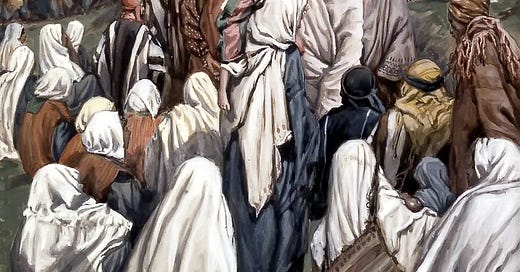
Seeing the crowds, Jesus went up the mountain, and when he sat down, his disciples came to him. And he opened his mouth and taught them, saying:
“Blessed are the poor in spirit, for theirs in the kingdom of heaven.
“Blessed are those who mourn, for they shall be comforted.
“Blessed are the meek, for they shall inherit the earth.
“Blessed are those who hunger and thirst for righteousness, for they shall be satisfied.
“Blessed are the merciful, for they shall receive mercy.
“Blessed are the pure in heart, for they shall see God.
“Blessed are the peacemakers, for they shall be called children of God.
“Blessed are those who are persecuted for righteousness’ sake, for theirs is the kingdom of heaven.
“Blessed are you when others revile you and persecute you and utter all kinds of evil against you falsely on my account. Rejoice and be glad, for your reward is great in heaven, for so they persecuted the prophets who were before you.”
Grievance seems to govern our world. Activists and partisans of every variety assure us that our privilege—or our lack of it—should frame our self-understanding, and our understanding of the people around us. This framework is as powerful on the political right as it is on the left.
In a world of grievance, your status comes from being aggrieved—from having been acted upon by others in the past. Because of what has been done to you, you should feel empowered.
In this world, any action against your oppressors is justified. Use force—after all, it was used against you first. Lie—because, after all, your enemy has never told the truth. Don’t bother trying to understand those who disagree with you—they’ve never extended that courtesy to you.
Jesus presents a very vision in this passage. In his vision, you are blessed because of what you can become. Your value comes not from your past, but from your future.
A couple examples of how this logic works—and how it’s an inversion of our world.
Blessed are the merciful, for they shall receive mercy.
The grievance model always insists that injustice comes from the other side, and must be met with reciprocal injustice. Any other response is foolishness: to act with justice toward an unjust opponent simply invites more injustice. But we see the fruits of this logic everywhere in our world, especially in the spirals of escalating rhetorical violence—and, increasingly, actual violence—against one’s enemies.
De-escalation requires an initial act of mercy. Breaking out of the spiral toward destruction must not start with your opponent: it needs to start with you. It’s when you are merciful that the cycle of mercy begins, and you are shown mercy in return.
Blessed are the meek, for they shall inherit the earth.
Surely, this teaching is false, right? All around us, we see clear evidence that it’s the powerful, not the weak, who have inherited the earth.
But what is this world that the powerful have inherited, and that they seek to shape in their image? A world that is falling apart, a crumbling world. The more tightly our institutions of power are grasped and fought over, the more calcified and untrustworthy they become. The more we see the world and our lives as zero-sum competitions against others to seize as much as we can, the less appreciate the beauty, the miracle, of life as it is.
Follow this logic to its conclusion, and the powerful are bound to destroy themselves. Our hope can’t be in any of the people who want to be in control, because their desire for power is proof of their unfitness to wield it. Of course, our leaders and politicians and titans of industry and influencers often do many good things, and bring much good to the world. But a little power isn’t ever enough—like money, it comes with a built-in thirst for more. Our hope can only be in the people who don’t want the power, because they’re the ones who don’t want more power.
Blessed are those who hunger and thirst for righteousness, for they shall be satisfied.
We can all see the many injustices of the world. The oppression of many of our systems and institutions. The grievance model tells us that the only option when confronted with injustice is to be unjust. The only option to confront violence is to win the battle. The only option to transforming corrupt and broken institutions is to burn them to the ground and rebuild them ourselves.
But Jesus understands that our actions shape our hearts. Our acts of injustice make us unjust, clouding our vision of justice. Our violent actions make us violent people. Our revolutionary fervor makes us people incapable of anything other than revolution—and institutions aren’t built during revolutions.
When we hunger and thirst for righteousness, we fill ourselves with it. And when we fill ourselves with it, we can bring it to the world around us. “Out of the abundance of the heart, the mouth speaks,” as Jesus teaches at another point.
Which beatitude do you have the hardest time understanding?
Examine your own heart: where can you be the one to break an escalating spiral by showing mercy, even where it’s undeserved?
What do you fill your mind with? What’s shaping your heart? How can you replace it with a genuine hunger & thirst for righteousness?




